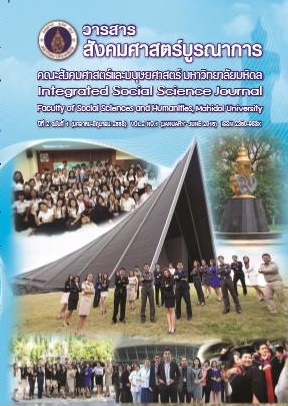แนวทางพัฒนาการจัดกิจกรรมบำบัดฟื้นฟูด้านยาเสพติดในสถานแรกรับเด็กและเยาวชน
Main Article Content
บทคัดย่อ
การศึกษาวิจัยนี้มีวัตถุประสงค์เพื่อศึกษาแนวทางพัฒนาการจัดกิจกรรมบำบัด ฟื้นฟู ด้านยาเสพติดในสถานแรกรับเด็กและเยาวชนและปัจจัยที่สัมพันธ์กับการจัดกิจกรรมบำบัดฟื้นฟู ด้านยาเสพติดในสถานแรกรับเด็กและเยาวชน ประชากรที่ใช้ศึกษาเป็นเด็กและเยาวชนในสถานแรกรับเด็กและเยาวชน ในเขตกรุงเทพมหานครและปริมณฑล ที่เข้าร่วมกิจกรรมบำบัดด้านยาเสพติด ในสถานแรกรับเด็กและเยาวชน จำนวน ๔๐๐ คน โดยใช้แบบสอบถามเป็นเครื่องมือในการเก็บรวบรวมข้อมูล วิเคราะห์ข้อมูล ผลการวิจัยสรุปได้ดังนี้
ด้านการประเมินประโยชน์ที่ได้รับในกิจกรรมบำบัดด้าน ยาเสพติด ในสถานแรกรับเด็กและเยาวชน ที่เข้าร่วม โดยภาพรวม กิจกรรมกลุ่มเสี่ยง กลุ่มตัวอย่างมีความเห็นในการประเมินประโยชน์ในระดับมากในทุก ๆ ด้านและมากที่สุดในกิจกรรมที่ ๔ เรื่องเกมส์กีฬา ต้านยาเสพติด กลุ่มเสพ จากกลุ่มตัวอย่างส่วนใหญ่มีความคิดเห็นเกี่ยวกับการประเมินประโยชน์ในกิจกรรมบำบัดด้าน ยาเสพติด ในสถานแรกรับเด็กและเยาวชน ที่เข้าร่วม โดยภาพรวมอยู่ในระดับมาก
ปัจจัยที่สัมพันธ์กับการจัดกิจกรรมบำบัด ฟื้นฟู ด้านยาเสพติด ในสถานแรกรับเด็กและเยาวชน ได้แก่ เพศ อายุ ภูมิลำเนาเดิม เพื่อน ระดับการศึกษา รายได้ สถานภาพสมรสของบิดามารดาปัจจุบัน เหตุผลในการใช้ยาเสพติดและการเข้าถึงของแหล่งยาเสพติด
ข้อเสนอแนะจากการวิจัย ได้แก่ ส่งเสริมกิจกรรมที่มีกีฬาเป็นพื้นฐาน คัดเลือกจัดกิจกรรมที่ช่วยเสริมการวางแผนอนาคต สอดแทรกการให้คำปรึกษาในกิจกรรม เพิ่มเนื้อหาที่สนับสนุนเป้าหมายชีวิตให้เด็กและเยาวชนมีส่วนร่วมในการวางแผนสร้างกิจกรรมรวมทั้ง การวิจัยเชิงคุณภาพเกี่ยวกับผลกระทบของการจัดกิจกรรม
Article Details
- วารสารสังคมศาสตร์บูรณาการ มหาวิทยาลัยมหิดล อนุญาตให้สามารถนำไฟล์บทความไปใช้ประโยชน์และเผยแพร่ต่อได้ โดยอยู่ภายใต้เงื่อนไขสัญญาอนุญาต CC Attribution-NonCommercial-NoDerivatives 4.0 International (CC BY-NC-ND 4.0) โดยต้องแสดงที่มา/การอ้างอิงจากวารสาร – ไม่ใช้เพื่อการค้า – ห้ามแก้ไขดัดแปลงเนื้อหา
- ข้อความที่ปรากฏในบทความในวารสารฯ เป็นความคิดเห็นส่วนตัวของผู้เขียนแต่ละท่าน ไม่เกี่ยวข้องกับกองบรรณาธิการวารสารฯ (ซึ่งหมายรวมถึง บรรณาธิการ ผู้ทรงคุณวุฒิในกองบรรณาธิการ หรือ บรรณาธิการรับเชิญ) แต่อย่างใด ความรับผิดชอบองค์ประกอบทั้งหมดของบทความแต่ละเรื่องเป็นของผู้เขียนแต่ละท่าน หากมีความผิดพลาดใด ๆ ผู้เขียนแต่ละท่านจะรับผิดชอบบทความของตนเอง ตลอดจนความรับผิดชอบด้านเนื้อหาและการตรวจร่างบทความเป็นของผู้เขียน ไม่เกี่ยวข้องกับกองบรรณาธิการวารสารฯ
- กองบรรณาธิการขอสงวนสิทธิ์ในการตัดทอน/ปรับแก้ถ้อยคำบางประการเพื่อความเหมาะสม
เอกสารอ้างอิง
August, G.J.; Lee, S.S.; Bloomquist, M.L.; Realmuto, G.M.; and Hektner, J.M. Dissemination of an evidence-based prevention innovation for aggressive children living in a culturally diverse, urban neighborhood: The Early Risers effectiveness study. Prevention Science, in press.
Goldberg, L.; MacKinnon, D.P.; Elliot, D.L.; Moe, E.L.; Clarke, G.; and Cheong, J.W. The Adolescents Training and Learning to Avoid Steroids Program Preventing drug use and promoting health behaviors Archives of Pediatric and Adolescent Medicine 154:332–338, April 2000.
Hansen, W.B.; Giles, S.M.; and Fearnow-Kenney, M.D. Improving Prevention Effectiveness. Greensboro, NC: Tanglewood Research, 2000.
Hawkins, J.D. and Catalano, R.F. Communities That Care: Action for Drug Abuse Prevention. San Francisco, CA: Jossey-Bass, 1992.
Hawkins, J.D.; Catalano, R.F.; and Arthur, M. Promoting science-based prevention in communities Addictive Behaviors 90(5):1–26, 2002.
Hecht, M.; Trost, M.; Bator, R.; and MacKinnon, D. Ethnicity and sex similarities and differences in drug resistance Journal of Applied Communication Research 25:75–97, 1997.
Ialongo, N.; Werthamer, L.; Kellam, S.; Brown, C.; Wang, S.; and Lin, Y. Proximal impact of two first-grade preventive interventions on the early risk behaviors for later substance abuse, depression, and antisocial behavior. American Journal of Community Psychology 27:599–641, 1999.
Kosterman, R.; Hawkins, J.D.; Spoth, R.; Haggerty, K.P.; and Zhu, K. Effects of a preventive parent-training intervention on observed family interactions: proximal outcomes from Preparing for the Drug Free Years. Journal of Community Psychology 25(4):337–352, 1997.
Kosterman, R.; Hawkins, J.D.; Haggerty, K.P.; Spoth, R.; and Redmond, C. Preparing for the Drug Free Years: Session-specific effects of a universal parent-training intervention with rural families. Journal of Drug Education 31(1):47–68, 2001.
Kumpfer, K.L.; Molgaard, V.; and Spoth, R. The “Strengthening Families Program” for the prevention of delinquency and drug abuse. In: Peters, R.D., and McMahon, R.J., eds. Preventing Childhood Disorders, Substance Abuse, and Delinquency Newbury Park, CA: Sage, 1996.
Kumpfer, K.L.; Alvarado, R.; Smith, P.; and Bellamy, N. Cultural sensitivity in universal family-based prevention interventions Prevention Science 3(3):241–246, 2002.
Kumpfer, K.L.; Alvarado, R.; Tait, C.; and Turner, C. Effectiveness of school-based family and children’s skills training for substance abuse prevention among 6-8 year old rural children Psychology of Addictive Behaviors 16(4S):S65–S71, 2002.
Lochman, J.E. and Wells, K.C. The Coping Power Program at the middle-school transition: Universal and indicated prevention effects. Psychology of Addictive Behaviors 16(45):S40–S54, 2002.
Moon, D.; Hecht, M.; Jackson, K.; and Spellers, R. Ethnic and gender differences and similarities in adolescent drug use and refusals of drug offers Substance Use and Misuse 34(8):1059–1083, 1999.
National Institute on Drug Abuse National Conference on Drug Abuse Prevention Research: Presentations, Papers, and Recommendations Bethesda, MD: National Institute on Drug Abuse, 1998
Halikas, James A., Goodwin, Donald W., and Guze, Samuel B. 1971"Marihuana Effects: A Survey of Regular Users." The Journal of the American Medical Association 217: 692-694.
Hochman, Joel S., and Brill, Norman Q. 1971 "Marijuana Use and Psychosocial Adaptation" Unpublished manuscript
Houser, Norman W. 1969 Drugs: Facts on Their Use and Abuse. Glenview, III.: Scott, Foresman.
Klingemann, H., and Bergmark, A., “Drug Treatment Systems in an International Perspective”, European Addiction Research Journal, vol. 5, No. 3 (1999)
Klingemann, H., and Hunt, G., eds., Drug Treatment Systems in an International Perspective: Drugs, Demons and Delinquents (London, Sage Publications, 1998).
Porter, L., Argandona, M., and Currant, W. J., Drug and Alcohol Dependence Policies, Legislation and Programmes for Treatment and Rehabilitation (World Health Organization, Geneva, 1999)
WHO Programme on Substance Abuse, Assessing the Standards of Care in Substance Abuse Treatment (World Health Organization, Geneva, 1993).


